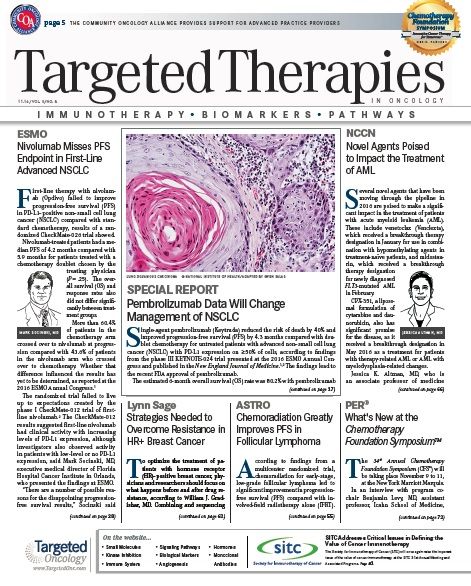Beyond Cost: SITC Addresses Critical Issues to Define the Value of Cancer Immunotherapy
SITC addresses the crucial value of cancer immunotherapy in discussions in a Value of Cancer Immunotherapy Summit.
1
2
For individual patients, cancer has been historically rated as one of the mostly costly medical conditions to treat in adults, second only to heart conditions.
3-5
In addition to rising treatment costs, analyses indicate that cancer patients are also subject to higher out-of-pocket costs, both during treatment and later as cancer survivors.Combined with the loss of income due to disease symptoms and debilitating side effects from therapy, cancer patients suffer financial hardships that can severely impact their quality of life and may affect decisions to continue therapy.6As a result, the rising cost of cancer care has been the subject of intense discussion within the oncology community, largely driven by physicians’ desire to help address and manage the issue of high treatment costs on behalf of their patients. Thus, there is a growing need to assess current therapeutic strategies, based on their overall value, to better inform treatment planning and decisions surrounding cancer care.
Over the last decade, cancer immunotherapies have dramatically changed the therapeutic landscape for cancer patients by providing a clinically beneficial alternative to traditional treatments. Recent FDA approvals have resulted in novel treatment options, and rapidly expanded indications for existing agents, to make immunotherapies accessible to patients across a variety of disease settings, including melanoma, hematologic malignancies, nonsmall cell lung cancer, prostate cancer, kidney cancer, bladder cancer, and head and neck cancer.7
With further FDA approvals on the horizon, as well as additional agents and combination therapies in clinical trials, cancer immunotherapies are expected to significantly impact current treatment standards in the coming years. Because these agents enhance or enable the intrinsic ability of the immune system to recognize and eliminate cancer, immunotherapies have been characterized by impressive durable responses, distinct side effects, and response kinetics that are unique compared with traditional cytotoxic and targeted therapies. However, previous reports and value frameworks centered on the value of cancer care have not fully considered the unique aspects of cancer immunotherapeutics, which has led to uncertainty about the real benefit of this therapeutic modality.
The Society for Immunotherapy of Cancer (SITC) was the first to initiate the important dialogue surrounding the value of cancer immunotherapy at the organization’s 30th Anniversary Annual Meeting in 2015.8This symposium, organized by Howard Kaufman, MD, FACS, and moderated by Peter Yu, MD, FACP, FASCO, brought together knowledge and insight from diverse perspectives, including academic scientists and physicians, experts in health care coverage and policy, representatives from industry, and patient support representatives. In this symposium, key aspects of the value proposition for cancer immunotherapy were discussed, including the significance of immune-based biomarker development, considerations for the cost of innovation, and both real-world and patient perspectives of value. The symposium concluded with an audience-generated question-and-answer session that paved the way for future discussions surrounding the value proposition for cancer immunotherapy.
Building on the success of the first symposium, a Value of Cancer Immunotherapy Summit will be held, as a part of the SITC 31st Annual Meeting, on November 13, 2016. Developed in collaboration with the American Society of Clinical Oncology (ASCO), the organizers for this program include returning faculty Drs. Kaufman and Yu, as well as Michael Atkins, MD, and Lowell Schnipper, MD, FASCO.
This half-day program will feature presentations by academic physicians, patient advocates, economists, and third-party payers. Highlights will include presentations on perspectives and evaluations of current value models, economic outcomes of cancer therapy, patient-reported outcomes in clinical trials, and patient perspectives on value. In addition to discussing the unique characteristics of immune-based agents and the value proposition for these therapies, the summit is expected to result in a referendum on future directions and priorities to better define the full value of cancer immunotherapy.
By fostering this dialogue between leading experts in the field and key stakeholders within the healthcare system, SITC is uniquely positioned to ensure that cancer immunotherapies are accurately represented within the ongoing discussion surrounding the rising cost of cancer care. In line with the society’s vision to make cancer immunotherapy a standard of care and the word “cure” a reality for cancer patients everywhere, it will be imperative to continue this ongoing discussion to ensure that patients are able to access therapeutic options that will result in high-value care.
References:
- Mariotto AB, Yabroff KR, Shao Y, Feuer EJ, Brown ML. Projections of the cost of cancer care in the United States: 2010-2020.J Natl Cancer Inst.2011;103(2):117-128. doi:10.1093/jnci/djq495.
- Soni A. Statistical Brief 470: trends in the five most costly conditions among the U.S. civilian institutionalized population, 2002 and 2012. Agency for Healthcare Research and Quality website.https://meps.ahrq. gov/data_files/publications/st470/stat470.shtml. Published April 2015. Accessed Sept 30, 2016.
- Guy GP Jr, Ekwueme DU, Yabroff KR, et al. Economic burden of cancer survivorship among adults in the United States.J Clin Oncol.2013;31(30):3749-3757. doi: 10.1200/JCO.2013.49.1241.
- Guy GP Jr, Yabroff KR, Ekwueme DU, et al. Estimating the health and economic burden of cancer among those diagnosed as adolescents and young adults.Health Aff (Millwood).2014;33(6):1024-1031. doi: 10.1377/hlthaff.2013.1425.
- Guy GP Jr, Yabroff KR, Ekwueme DU, et al. Healthcare expenditure burden among non-elderly cancer survivors, 2008-2012.Am J Prev Med.2015;49(6[suppl 5]):S489-S497. doi: 10.1016/j.amepre.2015.09.002.
- Ekwueme DU, Yabroff KR, Guy GP Jr, et al. Medical costs and productivity losses of cancer survivors--United States, 2008-2011.MMWR Morb Mortal Wkly Rep.2014;63(23): 505-510.
- U.S. Food and Drug Administration. Hematology/oncology (cancer) approvals & safety notifications. FDA website.http://www.fda.gov/Drugs/InformationOnDrugs/ApprovedDrugs/ucm279174.htm. Updated September 15, 2016. Accessed September 30, 2016.
- SITC among first to address value proposition of cancer immunotherapy [press release]. National Harbor, MD: Society for Immunotherapy of Cancer; November 8, 2015.http://www.sitcancer.org/about-sitc/newsroom/press-releases/sitc-among-first-to-address-value-proposition-of-cancer-immunotherapy.
Survivorship Care Promotes Evidence-Based Approaches for Quality of Life and Beyond
March 21st 2025Frank J. Penedo, PhD, explains the challenges of survivorship care for patients with cancer and how he implements programs to support patients’ emotional, physical, and practical needs.
Read More
